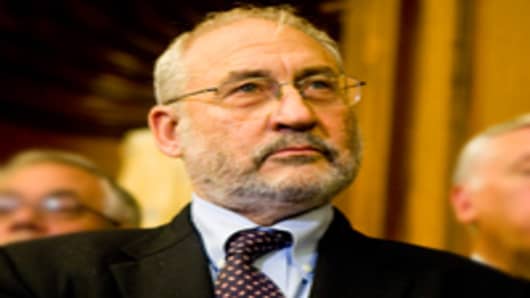“I’m very suspect of quantitative easing,” he said on Thursday. “The only part of quantitative easing that is likely to work is dragging down the dollar .”
Thougha weaker dollar may stimulate U.S. exports and ward off deflation, any growth achieved that way comes at an equal cost to other nations. They may also feel forced to respond by weakening their own currencies or erecting trade barriers to U.S. goods.
“Competitive devaluation is a form of growth that comes at the expense of others,” he said. “It is likely to present problems for the global economy going forwards.”
A harsh critic of the finance-industry rescue package under the Bush and Obama administrations, Stiglitz said it was entirely reasonable for theFederal Reserve to do what it can to stimulate the U.S. economy after the bursting of the property bubble – “particularly since they caused the problem.”
After the tech bubble burst, the low interest rates designed to alleviate that recession led to the property bubble. And today’s low interest rates will surely cause another bubble, he cautioned.
“I’m not sure where or what, but it’s probably going to be in emerging markets, and not going to be good for the world,” he said. “There is a real risk this is going to end badly, as the two previous bubbles ended badly.”
Only global cooperation, and a new standard for a global currency that moves away from the U.S. dollar, will help the world move away from a constant cycle of boom and bust, Stiglitz said.
Instead of being loaned or invested within home economies, stimulus cash in the Western world is forming “an onslaught of hot money,” flowing to emerging markets, particularly Asia, chasing the areas of highest growth.
He encouraged countries to put in place regulations that discourage short-term inflows and encourage long-term investment.
That is something China has done very successfully, he feels, while he worries that India is too open to capital inflows. India risks overheating as a result, and real-estate prices there already look out of line, he said.
Stiglitz, now a professor at Columbia University, said it was “almost a relief” to be back in Asia, compared with the dour realities of the United States. He was speaking at the MIPIM Asia real estate conference at the Hong Kong Convention and Exhibition Centre.
“America always prides itself in a spirit of optimism, but it’s very hard to have that spirit right now in America,” he said. “But Asia has that spirit.”
Unless the U.S. reforms its financial system to force big banks back into lending to small and mid-size business, it is likely to stutter. Stiglitz also believes that the U.S. should embark on further stimulus – which would be expensive but would ultimately pay for itself in the form of higher tax revenues.
As it is, the Western world is caught in a downward spiral of declining spending and government income that will be hard to break. “The U.S. and Europe I am afraid are set for what might be called a Japanese-style malaise, a long period of very slow growth,” he said.
In mitigation, the U.S. may see slightly higher growth than Japan. That is because the Japanese economy had zero growth in its labor force during its “Lost Decade,” whereas the U.S. labor force is growing at 1 percent, he explained.
But the American economy is worse off than post-'80s Japan in terms of its jobless rate. At its peak, unemployment in Japan was at 5 percent, whereas U.S. unemployment currently stands at 9.5 percent, with one in six Americans who want a full-time job unable to land one.
“The U.S. has much higher inequality and a weaker safety net,” Stlglitz noted. “For anybody worried about social instability, that’s a real concern.”


